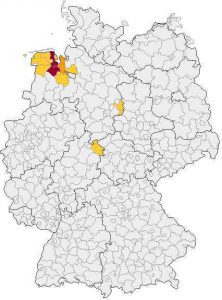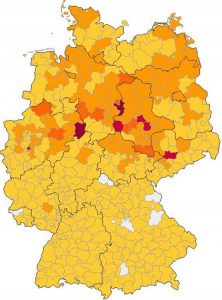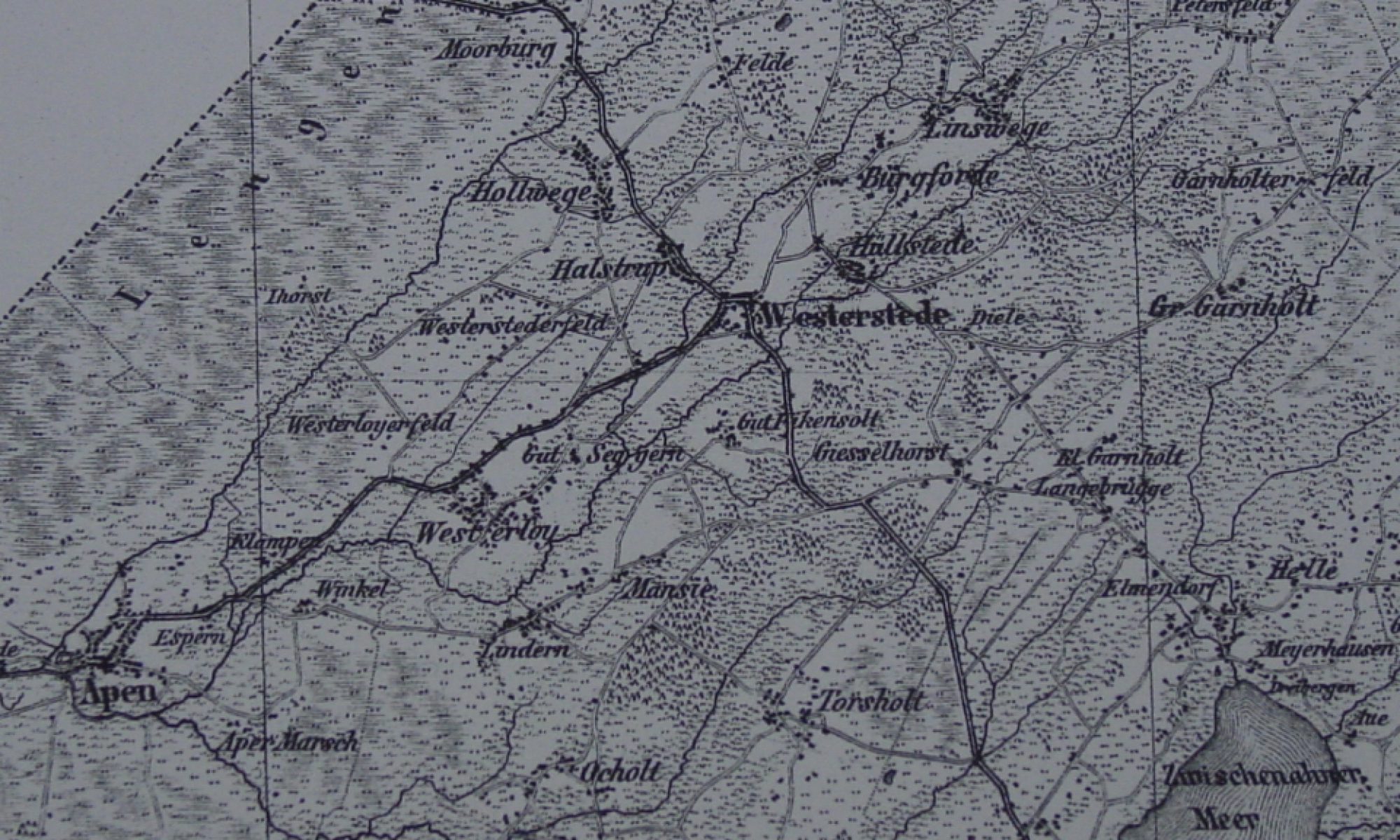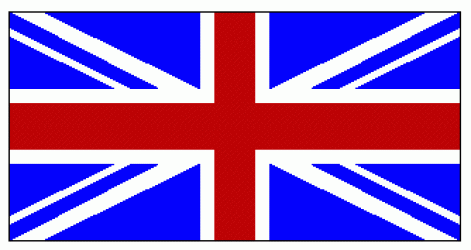The Origin of the Names HOBBIE and HOBBEN
The today frequent use of Anglizismen suggests these surnames with the English term „hobby“ for hobby-horse (also swing or carousel-horse) in connection with superficial view suggests. Already in the old English and old French language there is the word „hobin“ for small horse. According to „Webster’s New International Dictionary“ „hobby“ is also the name for „small falcon“, which in German corresponds to the word „Baumfalke“. And indeed one finds in the English list of coats of arms „Burkes General Armory of England, Scotland and Ireland“ from 1884 a coat of arms „Hobbie“ as black-and-white illustration reproduced, which shows three hobby. This coat of arms is represented by commercial publishing houses (Swyrich Corporation) also in color and in slightly different variants for „Hobbie“ (from Berwickshire) and for „Hobby“ (from Leicester).
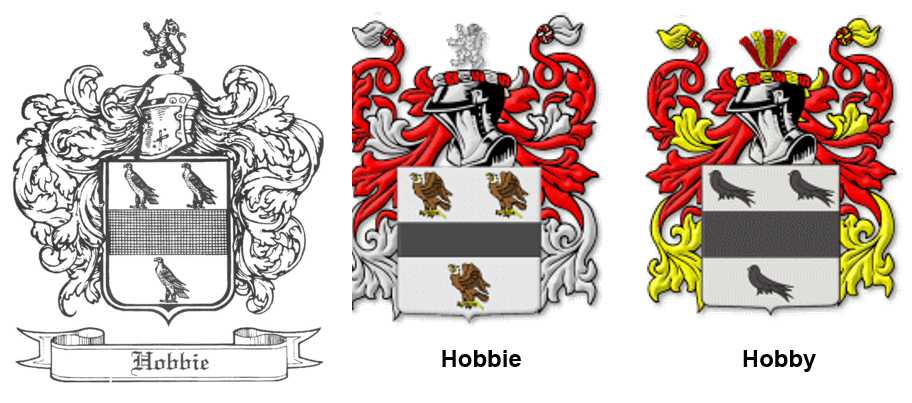
In the corresponding coat of arms description the name variants „Hob, Hobbie, Hobby“ are attributed to northern England and Scotland and are documented there already before the Norman conquest starting from 1066 AD. The name HOBBY is attributed to a family who lived in a village called HOBY in the county of Leicestershire. The spelling HOBBIE is first mentioned in the county of Berwickshire on the border with Scotland. According to English sources, these names can be traced back to the Anglo-Saxons and all originated well before the year 1000 AD. The Angles and the Saxons, in which also the Chauks settling in the Weser-Ems area had merged, had moved from 400 A.D. from the North German area to England, thus at a time, when there were already settlements in the „Friesische Wehde“ and around Westerstede. Thus, the English families HOBBIE and HOBBY could theoretically descend from the German ancestors.
But since the names HOBBIE and HOBBEN only appear much later in northern Germany in the Duchy of Oldenburg, a reverse descent could not be completely ruled out, since soon after the migration of the peoples English monks (including Bonifatius and Willehad) came to the mainland and also to Friesland around 800 AD to win the inhabitants there for Christianity. During this attempt, however, the Frisians resisted their mission for some time.
None of these seemingly obvious theories will be correct, because in the small rural settlements there were initially no fixed family names. One called oneself with first names and differed with same first names in the settlement at most by a name addition, which could solidify then later to a family name. This addition to the name could refer to the location of the farm or to the origin of an immigrant (e.g. Busch, Brink or Hüllstede, Bremer, Hollander, Schwabe etc.) or to the special characteristic (e.g. „Lang“ or „Schlendrian“) and activity (e.g. „Müller“, „Schmidt“, „Schomaker“) of the bearer of the name. In the case of children, the name of the father was added if there was a risk of confusion, which led to the patronymic naming still to be explained. Therefore, similar or identical names could develop independently in different places.
Surnames in rural northern Germany only became established from the 14th/15th century onwards. In the Ammerland, the earliest persons with first and last names and thus also the „Hobbies“ can be found after 1400 : The „Oldenburger Salbuch“, a register of landed property and income of the Counts of Oldenburg drawn up by the Drosten Jacob von Specken between 1428 and 1450, mentions them: Teyleke HOBBING in Linswege (the place „Lynsvidon“ should have existed already 1124), Hanneke HOBBING in Hollwege and Reyner HOBBEN in Ocholt. Gerke HOBBINGE is mentioned in a document of 1437 on a property in Apen.
The meaning of the names HOBBIE and HOBBEN
If one follows the prevailing opinion of renowned name researchers, then HOBBIE / HOBBEN, like many other surnames, are derived from first names. In the DTV atlas „Namenkunde“ is called under reference to the „Althochdeutsch“:
– hugu = Hugo, Huge, Hug; beraht = -bert, -brecht;
– hugu + beraht = Hubert, Hobbje, Hopp.
Joseph K. Brechenmacher writes about it in the „Etymological Dictionary of German Family Names“:
– Hob, Hobbie, old north german dialect for Hugbald, Hugbert
– Hobbeke (Frisian mother name, man / son of Hobbeke),
– Hob(b)ing patronymic Hubert (Frisian).
(Similar to Hans Bahlow in his „Niederdeutsches Namenbuch“).
While in East Frisian the names Habbe and HABBEN have spread as first and last names, and in Oldenburg the surnames HÖPCKE and HÖPKEN have originated in Helle, Hankhausen and Obenstrohe from the early first name Hobbeke, the first name Hobbe is not found at all in the Oldenburg Salbuch and in other regions only very sporadically. Therefore the origin of the surnames HOBBING and HOBBEN from the first name Hobbe is rather unlikely.
Is the name possibly derived from a location name like there was a village called HOBY in England? For ancestors of the German families HOBBIE such a connection is not recognizable so far, even if there is a settlement place with the designation „Hobbie“ with Roffhausen in the municipality Schortens with Wilhelmshaven, as still in recent time the official Topographische map 1:50,000 showed.
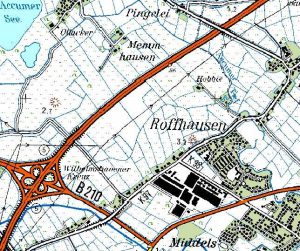 Research has shown, however, that at no time was an owner of a similar name mentioned for this farm and for the surrounding area. In the earth and church books of Schortens this location was called „in die Hoppin“ in 1683, „in de Hopje“ from 1748 and „bey klein Hobbie“ in 1806. And later the Accumer Pastor, not a local, hypertextated the designation „in der Hopphei“ to High German „Hobbie“, as it was then also consolidated in the first land map XXIII of April 1842 with „Abteilung I, Hobbie“. The name was described with „Bergstück“ near the old castle site. Accordingly, this designation goes back to the nearby hill of the former castle Roffhausen.
Research has shown, however, that at no time was an owner of a similar name mentioned for this farm and for the surrounding area. In the earth and church books of Schortens this location was called „in die Hoppin“ in 1683, „in de Hopje“ from 1748 and „bey klein Hobbie“ in 1806. And later the Accumer Pastor, not a local, hypertextated the designation „in der Hopphei“ to High German „Hobbie“, as it was then also consolidated in the first land map XXIII of April 1842 with „Abteilung I, Hobbie“. The name was described with „Bergstück“ near the old castle site. Accordingly, this designation goes back to the nearby hill of the former castle Roffhausen.
The most probable explanation for the name’s origin is probably the following: In Matthias Lexer’s „Mittelhochdeutschen Handwörterbuch“ the following can be read:
– huobe = piece of land, given to a full farmer („Hufe“),
– huobe, huobener = Owner of a Hufe, hereditary farmer.
Since the ancestors HOBBING and HOBBEN in Linswege, Hollwege, Apen and Ocholt each had centrally located farms, the designation „huobe“ could have been added to their first names, whereby the Old High German suffix „-ing“ in principle denoted membership of the preceding part of the word.
The different name variants of the HOBBIE and HOBBEN families
Since the surnames HOBBING, HOBBEN, HOBBY, HOBBIE etc. originated in centuries, when bourgeois bearers of the name were not yet familiar with reading and writing, pastors and officials who were familiar with writing were only able to write down the names by ear in church books and documents. Accordingly, different spellings developed from the high- or local-language (Low German) sound of the names: HOBBYE, HOBBEIE, HOB(B)I, HOBIE, HOB(B)JE. The spellings „Hobbeie“, „Hobbje“ and „Hobje“ are the written form of the Low German spoken „Hobbie“. Only with the Reichspersonenstandsgesetz, which came into force in 1876, names could only be changed by an official process.
The origin of the later genealogical branch lines HOBBIEBRUNKEN, HOBBIEJANSSEN, HOBBIESIEFKEN / HOBBENSIEFKEN, HOBBIEOLTMANNS, HOBBIEGERDES and HOBBIEÖTJEN follows the patronymic rules of the Ammerland, which differ from those in East Frisia. In East Frisian, for example, the first-born son was named after the grandfather, while the paternal first name became his surname. For example, Gerdt Wilcken was the son of Wilke Gerdes. Correspondingly, the first names and surnames with the same sound, such as Siveke Siveken or Röbe Röben, were created. Today we are familiar with the patronymic formation of names by Jan Ulrich and Thomas Gottschalk, among others. Also in the Ammerland, the first-born son often received the first name of the grandfather, the second-born that of the father, so that beside the family name also the first names remained in the family or on the hereditary farm. The same can also be found with the grandmothers, mothers and daughters.
Since other sons, who at that time mostly stayed in the same village or nearby, also passed on the grandfatherly and paternal first names to their sons, there were often persons with identical names. For better differentiation, patronymic double names were created in Ammerland from the 17th century onwards. For example, the two sons Gerd and Brunke von Dierk Hobbie named their first-born sons after their grandfather „Dierk“. While the son of the court heir Gerd was simply called „Dierk Hobbie“, the name „Dierk Hobbiebrunken“ was used for Dierk, the son of Brunke Hobbie.
Thus the following name variants spread under the families HOBBING, HOBBIE and HOBBEN with German origin:
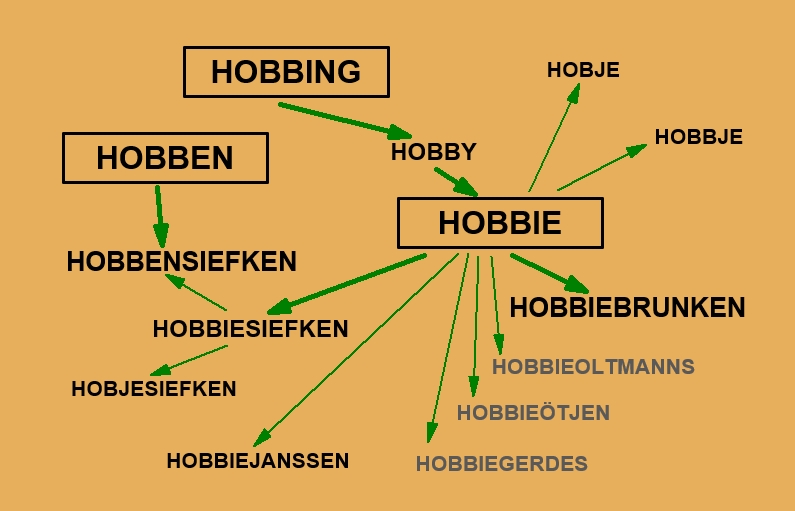 Altogether 14 different spellings of the names HOBBEN and HOBBIE have established themselves in the 12 family trees of German origin. These family trees are very well documented by entries in church books since the 17th century and in old documents. Very probable is also the descent of only two to three common „original families“, which is no longer provable due to the lack of historical sources.
Altogether 14 different spellings of the names HOBBEN and HOBBIE have established themselves in the 12 family trees of German origin. These family trees are very well documented by entries in church books since the 17th century and in old documents. Very probable is also the descent of only two to three common „original families“, which is no longer provable due to the lack of historical sources.
The name HOBBEN with origin in Ocholt and Apen led only to one name variant HOBBENSIEFKEN with origin in Westerloy.
The name HOBBING with origins in Linswege, Hollwege and Apen soon changed to HOBBY and HOBBIE.
And from HOBBIE the variants HOBBJE and HOBJE as well as the previously mentioned double names HOBBIESIEFKEN, HOBBIEBRUNKEN and HOBBIEJANSSEN emerged.
The family lines HOBBIEGERDES and HOBBIEÖTJEN from Zetel and HOBBIEOLTMANNS from Hollwege have been extinct for years.
Other similar surnames
The family name HOBBEN can also be found in the area from the south of the Netherlands to northern France, but it is usually a variation of the former French spelling HOUBEN.
In Switzer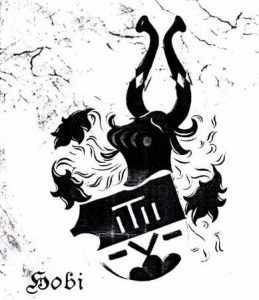 land live about 2.000 people called „HOBI“, whose origin can be traced back to the coat of arms of the Swiss families Hobi 1400 in Eastern Switzerland. These families originally came from the surroundings of Mels near Sargans in the Rhine valley near Liechtenstein and were already mentioned there in 1263 as „Hohpein“, where they were subject to tax at the Pfävers monastery. Later spellings are also „Hovbin“, „Hobain“ and finally „Hobi“. The family coat of arms is documented in „M. Gmür of Swiss privat brands and wooden certificates“ (source: Simon Hobi, Heiligkreuz/Switzerland).
land live about 2.000 people called „HOBI“, whose origin can be traced back to the coat of arms of the Swiss families Hobi 1400 in Eastern Switzerland. These families originally came from the surroundings of Mels near Sargans in the Rhine valley near Liechtenstein and were already mentioned there in 1263 as „Hohpein“, where they were subject to tax at the Pfävers monastery. Later spellings are also „Hovbin“, „Hobain“ and finally „Hobi“. The family coat of arms is documented in „M. Gmür of Swiss privat brands and wooden certificates“ (source: Simon Hobi, Heiligkreuz/Switzerland).
One could assume that the American beach catamaran „Hobie Cat“ was named after its designer. However, he was called Hobart Laidlaw Alter, and „Hobie“ was only his nickname and the name of the shipyard.
The family name HOPPE, which is almost 100 times more frequent in Germany and which, according to name researchers, is derived from hop growers or traders, also has a clear different origin, as the comparison of the relative frequency distribution based on the telephone directory entries from 2002 shows (source: Geogen 3.1 by Christoph Stoepel, http://christoph.stoepel.net/ViewSoftware.aspx?id=0200).
